How Yorkshire Ripper's terror 'changed the world for women'
- Published
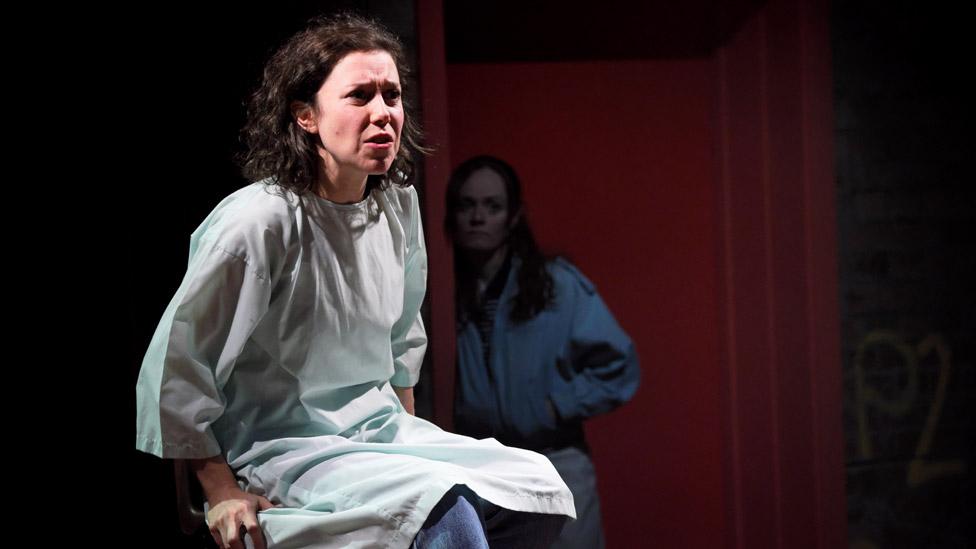
Tessa Parr (left) and Natalie Gavin are among the play's all-female cast
"This is not a story about the Yorkshire Ripper," says the website for a new play called There Are No Beginnings.
That is to let people know the play sort of does have something to do with the serial killer - but that he's not in it, nor are his victims, and it's certainly not the well-told story of the police's long, flawed hunt for him in the late 1970s.
There Are No Beginnings tells a different story. It's about the fear his five-year reign of terror instilled among women in the region - who were not only afraid of him, but effectively found themselves under a curfew - and how those women ultimately pulled together and stood up to the impact it had on their lives.
"There is no mention at all of Peter Sutcliffe in this play," says its writer Charley Miles. "It is not a play about him, for him, to empower him in any way, shape or form.
"The greatest thing that we can do I think is just to forget him, ignore him. Why do we know his name and yet we don't know the names of the 13 women he killed?
"So this play is about how that point in history, those five years, changed the world for women in the north and beyond."
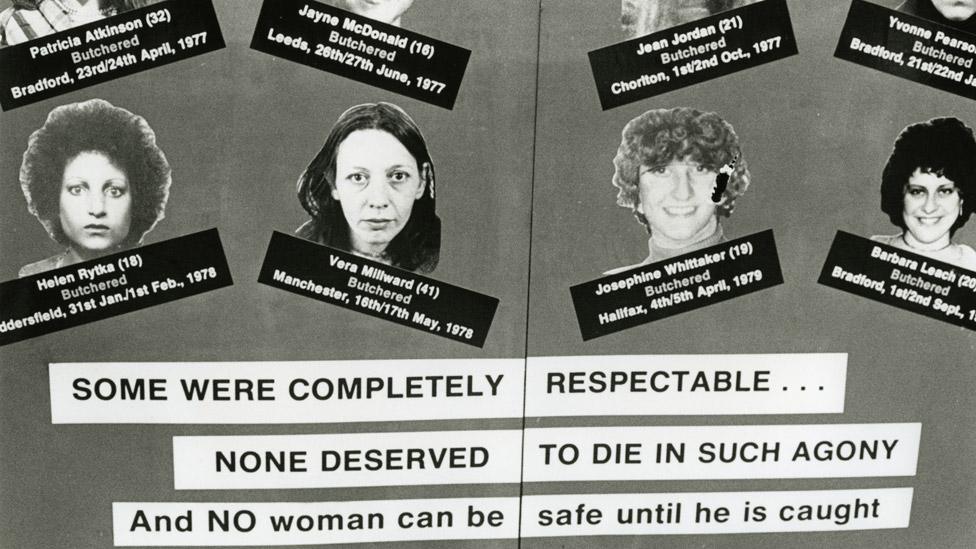
The approach of the police, including in campaigns like this, has been heavily criticised
The play stars Broadchurch and Coronation Street's Julie Hesmondhalgh, and is the first to be staged in a new studio theatre at the renovated Leeds Playhouse. The action begins on the day of Sutcliffe's first murder in October 1975 and ends on the day of his arrest in January 1981.
The number of attacks (he attempted to murder at least seven more women), the killer's notoriety and the length of time he was on the loose meant fear and suspicion ran deep.
In a letter to feminist journal Spare Rib at the time, one person said she had "to think twice before taking a trip to the corner shop".
"I've had five years of looking hard at every man I know and fearing he could be the one," she wrote. "I've had five years of impotent fury at being chained in [at night] when I'd rather be out."
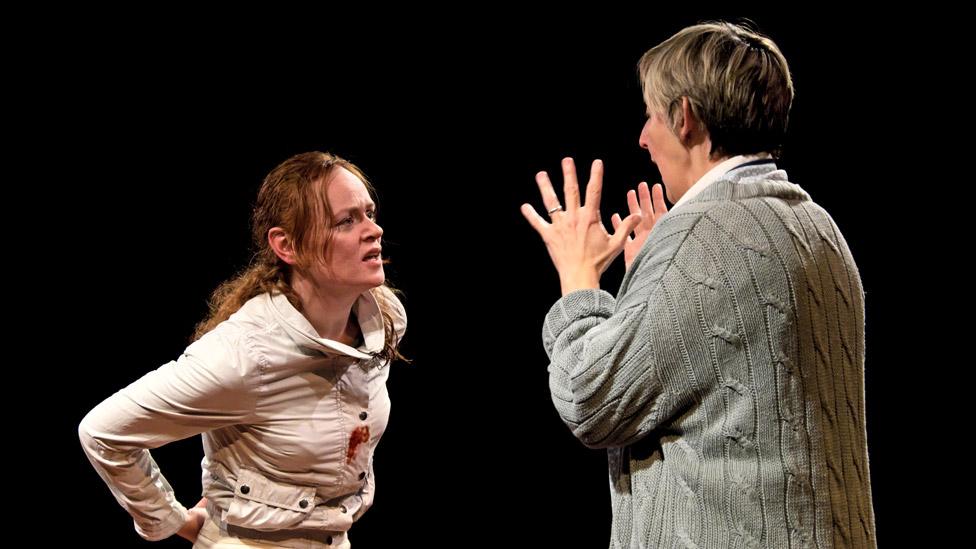
Julie Hesmondhalgh (right) plays June, based on a real woman
While some women found it easier than others to get on with day-to-day life, Miles believes it was such a shocking case that it marked a shift in the national psyche. "I think this was the birthplace of modern fear, if that doesn't sound too dramatic."
The 28-year-old playwright grew up near Thirsk in North Yorkshire, but never visited Leeds as a child. When she and her family dropped her older sister off at university in the city, she was surprised to see her mum getting more and more "hysterical" the closer they got.
"It transpired that the reason we never came here was because my mum was a teenager at the time when the Yorkshire Ripper was… when that period of history was happening, and still had this inherent distrust of the place," she says.
"And the more I thought on that, and the more I read around it, the more I got frustrated that I never got to hear the stories of people like my mum." She adds: "It had an enormous impact on her as a teenager, and consequently on how she raised her children."
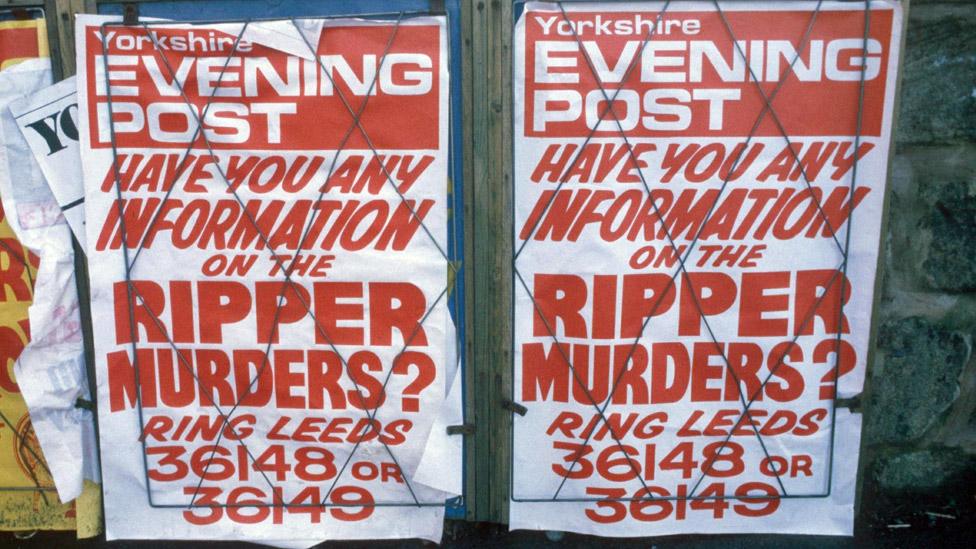
It took five years for police to catch Peter Sutcliffe
Miles set about telling that story, tapping into her mother's memories and speaking to women from Leeds Playhouse's over-55s group, Heydays. "I would get them all in a room with a tape recorder and get them to talk about Leeds in the 1970s. The unburdening of these sessions for these women was quite incredible. The most common thing that came up was how afraid everybody was at the time."
A common theme, she says, was how the fear ratcheted up after the murder of 16-year-old Jayne MacDonald in 1977, who was dubbed an "innocent victim", countering the police's theory that Sutcliffe was only targeting prostitutes.
After that, police told women in the city: "Do not go out at night unless absolutely necessary, and only if accompanied by a man you know."
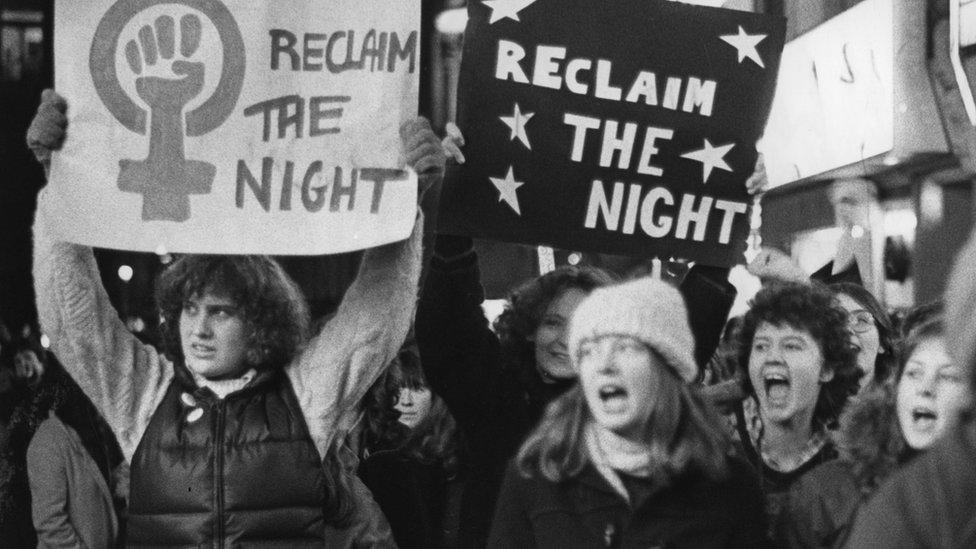
Reclaim the Night marches spread around the country after starting in Leeds
The impact on women's lives was big, Miles says. "If you work on night shifts, how do you get to work? Because you've been told not to get on buses late at night by yourself. And you're not allowed to walk after dark."
During her research, she spoke to someone who ran night classes for women. "And women stopped coming to the night classes, obviously," Miles says. "So the night classes disappeared altogether. It's mad when you think about how one man impacted all of that for a whole generation of women."
Some decided to take a stand, and in 1977 the first Reclaim the Night march took place in Leeds, with women carrying banners bearing slogans like "No Curfew on Women - Curfew on Men". The event is recreated in the play.
Reclaim the Night marches spread around the UK, and have gained fresh impetus in recent years in the wake of the #MeToo movement.
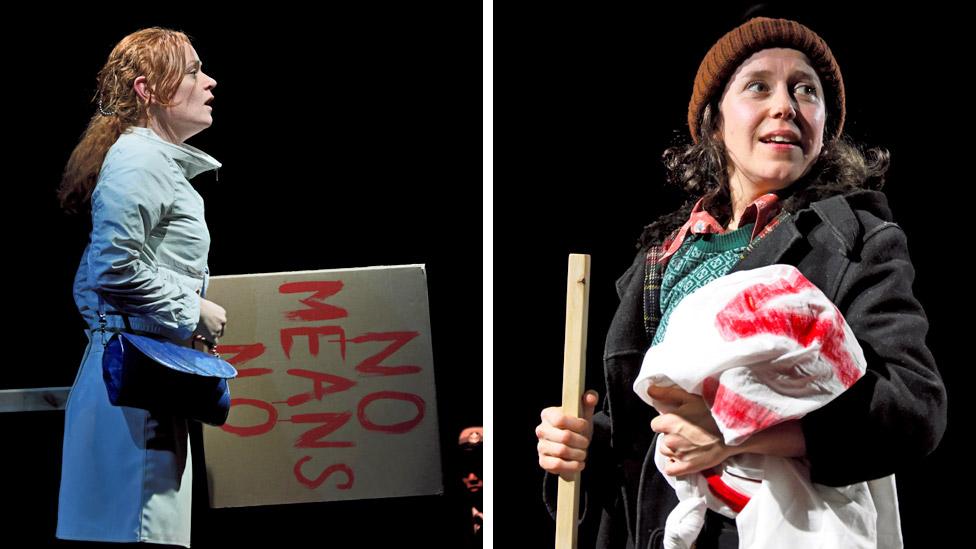
Natalie Gavin and Tessa Parr recreate the first Reclaim the Night march
The drama has an all-female cast and creative team, with Hesmondhalgh playing June, based on one of the Heydays women who ran a home for vulnerable and exploited young women.
Hesmondhalgh says: "What's interesting is to be doing this play in this period of time, very shortly after #MeToo, and seeing how far we've come, and how very, very little movement there's been since then."
She points to the language used by the police and press about the deaths of five sex workers in Ipswich in 2006, which was not so different to that used about the Yorkshire Ripper case.
"It feels like there hasn't really been enough of a time of reflection about that time, and the way we talked about the victims and survivors," Hesmondhalgh says.
"But now we're into a period where women have been really emboldened and empowered by the #MeToo movement, and I think now is the absolute time to start thoroughly reflecting on the language of those times and the politics of it, and talk about how we can move forward from it now, all those years on."

Follow us on Facebook, external, or on Twitter @BBCNewsEnts, external. If you have a story suggestion email entertainment.news@bbc.co.uk, external.
- Published16 July 2010